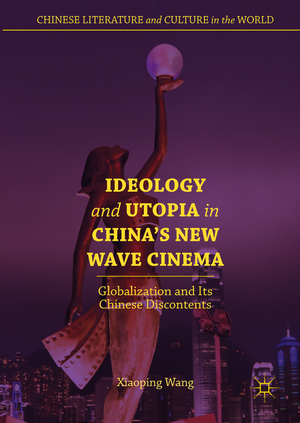Ideology and Utopia in China's New Wave Cinema: Globalization and Its Chinese Discontents: Chinese Literature and Culture in the World
Autor Xiaoping Wangen Limba Engleză Hardback – 11 iul 2018
| Toate formatele și edițiile | Preț | Express |
|---|---|---|
| Paperback (1) | 419.04 lei 38-45 zile | |
| Springer International Publishing – 14 dec 2018 | 419.04 lei 38-45 zile | |
| Hardback (1) | 473.34 lei 6-8 săpt. | |
| Springer International Publishing – 11 iul 2018 | 473.34 lei 6-8 săpt. |
Preț: 473.34 lei
Preț vechi: 556.87 lei
-15% Nou
Puncte Express: 710
Preț estimativ în valută:
90.57€ • 94.56$ • 74.96£
90.57€ • 94.56$ • 74.96£
Carte tipărită la comandă
Livrare economică 04-18 aprilie
Preluare comenzi: 021 569.72.76
Specificații
ISBN-13: 9783319911397
ISBN-10: 3319911392
Pagini: 191
Ilustrații: VIII, 265 p. 33 illus.
Dimensiuni: 148 x 210 mm
Greutate: 0.48 kg
Ediția:1st ed. 2018
Editura: Springer International Publishing
Colecția Palgrave Macmillan
Seria Chinese Literature and Culture in the World
Locul publicării:Cham, Switzerland
ISBN-10: 3319911392
Pagini: 191
Ilustrații: VIII, 265 p. 33 illus.
Dimensiuni: 148 x 210 mm
Greutate: 0.48 kg
Ediția:1st ed. 2018
Editura: Springer International Publishing
Colecția Palgrave Macmillan
Seria Chinese Literature and Culture in the World
Locul publicării:Cham, Switzerland
Cuprins
1. China’s “New Wave Cinema” in the Era of Globalization.- 2. The Arrival of Post-Socialism: Silence, Sound and Fury.- 3. The Fate and Fantasy of China’s “New Poor”.- 4. The Taste and Tragedy of China’s “Middle Class”.- 5. Memoire of Socialism and the Chinese Enlightenment.- 6. Elitism of Populism? The Problematic of Imagining the Other.- 7. The Politics of Dignity and the Destiny of China’s New Wave Cinema.
Notă biografică
Xiaoping Wang is Chair Professor of Chinese Studies at Huaqiao University, China. He has published more than 100 research articles on modern and contemporary Chinese literature, culture and critical theory.
Textul de pe ultima copertă
Ideology and Utopia in China’s New Wave Cinema investigates the ways in which New Wave filmmakers represent China in this age of neoliberal reform. Analyzing this paradigm shift in independent cinema, this text explores the historicity of the cinematic form and its cultural-political visions. Through a close reading of the narrative strategy of key films in New Wave Cinema, Xiaoping Wang studies the movement’s impact on film, literature, culture and politics.
Caracteristici
Provides a rigorous critique of China’s new independent cinema Studies the political, cultural and societal landscape of post-socialist China Utilizes a Marxist perspective to unpack the problematic cultural politics of new wave films















